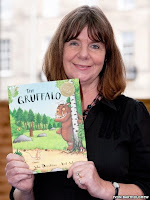 |
Julia Donaldson, author of the fabulous
children's book The Gruffalo |
You might be wondering 'why on earth is Angela posting BBC stories about malnourished children on this blog?'. Well, this is a food blog and even though this article by BBC News' education reporter Hannah Richardson isn't directly related to enjoying food as such, I think it is important for those of us fortunate enough to be able to enjoy a smorgasbord of culinary delights every other day to remember that there are people - specifically innocent young kids - who can't.
Also, as a writer and avid reader, this topic is a big issue for me as I think that reading is something every child should have the opportunity to enjoy and become good at. The fact that malnourishment affects kids on this level (which isn't surprising) saddens me. All I'm saying is, the next time you're about to moan about how dry your turkey sandwich is, remember that there are some children who don't have any lunch at all.
At the same time, I don't want to cause you indigestion caused by anxiety, so if you would like to help feed hungry children around the world, do some research and donate your time or cash to help. I don't want to promote any one charity over another which is why I'm not posting any links on here. I just want to make clear that I'm not saying feel guilty about eating. I think we should be grateful and enjoy our food. Just stay informed...
A group of leading authors including Julia Donaldson is
highlighting new research that malnutrition leaves children struggling to read
and write.
The children's laureate backs a global study that suggests children who are
badly malnourished are 20% more likely to misread simple sentences.
The Save the Children report on 7,300 eight-year-olds says quality schooling
can be cancelled out by malnourishment.
A quarter of the world's children are thought to be stunted by
malnutrition.
The Gruffalo author is joined by Michael Morpurgo, Philip Pullman, David
Walliams and others in raising concerns about the connection between
malnourishment and poor literacy levels ahead of the G8 global nutrition summit
in London on 8 June.
'Disadvantaged'
She says: "The devastating impact of malnutrition shouldn't be
underestimated. It stunts a child's development, sapping the strength of their
minds as well as their body, depriving them of the chance to be able to read or
write a simple sentence.
"Leaders attending this summit have a golden opportunity to stop this. They
must invest more funding to tackle malnutrition if we are to stop a global
literacy famine."
The long-term consequences of child malnutrition for health and resilience to
disease are well established. But this research, carried out by the University
of Oxford for the charity, presents new evidence that for the first time
identifies the impact of malnutrition on educational outcomes across a range of
countries.
The researchers followed children in four countries - Ethiopia, India, Peru
and Pakistan - throughout their childhood, interviewing and testing them at key
points in their lives to determine their educational abilities, confidence,
hopes and aspirations.
The study suggests children who are malnourished at the start of life are
severely disadvantaged in their ability to learn.
As well as the lower basic literacy abilities, stunted children score 7%
lower on maths tests and are 12% less likely to be able to write a simple
sentence at the age of eight compared with non-stunted children.
They are also 13% less likely to be in the appropriate grade for their age at
school.
Save the Children chief executive Justin Forsyth said: "These findings
confirm our very worst fears - that poor nutrition is capable of seriously
damaging a child's life chances before he or she even sets foot in a classroom.
"We have made huge progress in tackling child deaths, but having a quarter of
the world's children at risk of underperforming at school will have grave
consequences for the fight to end global poverty."





























